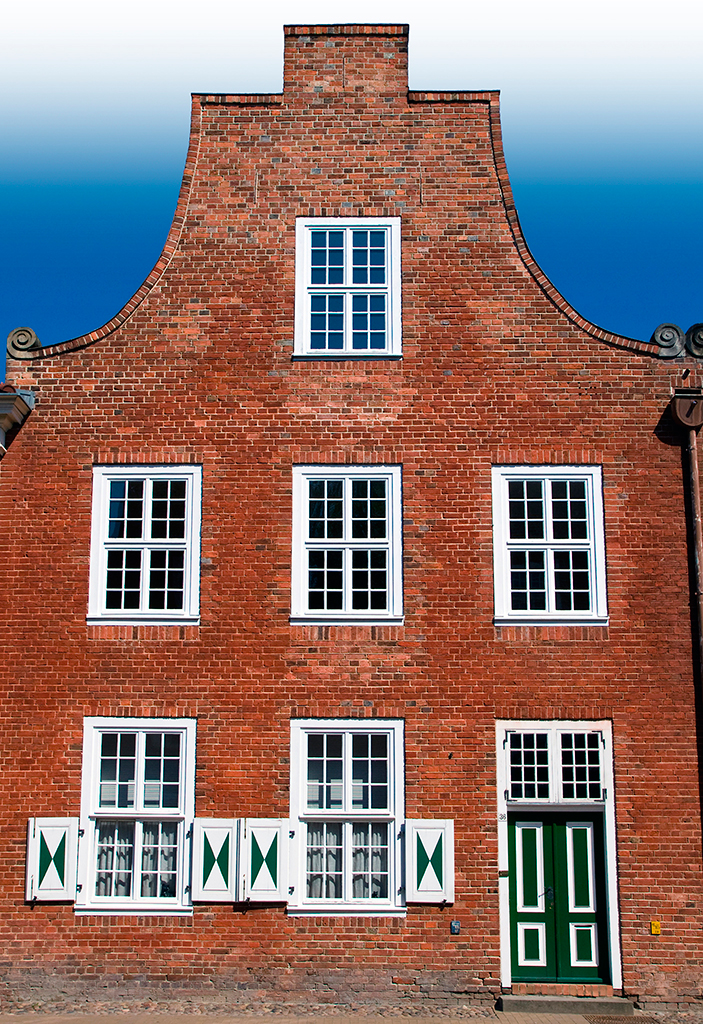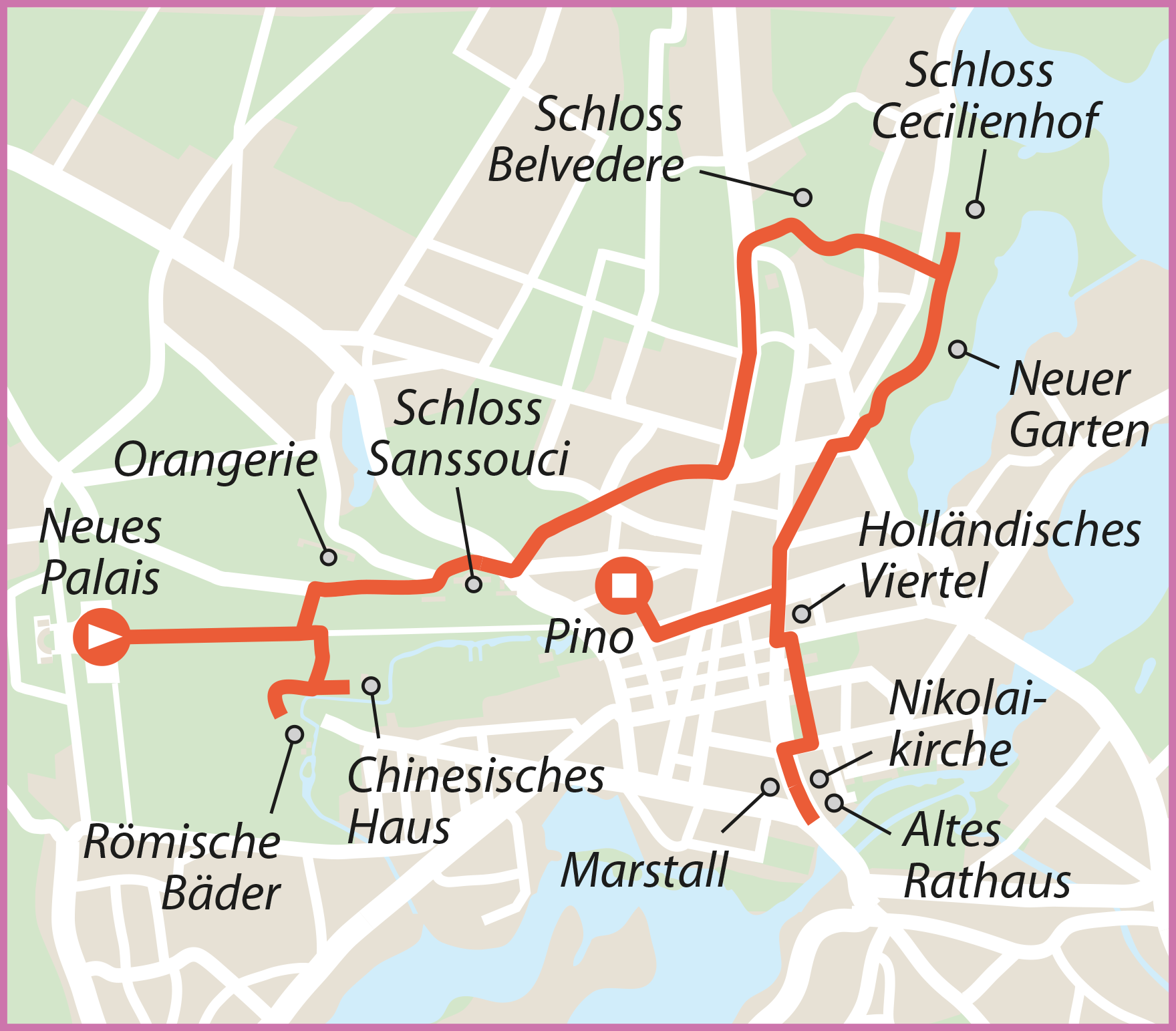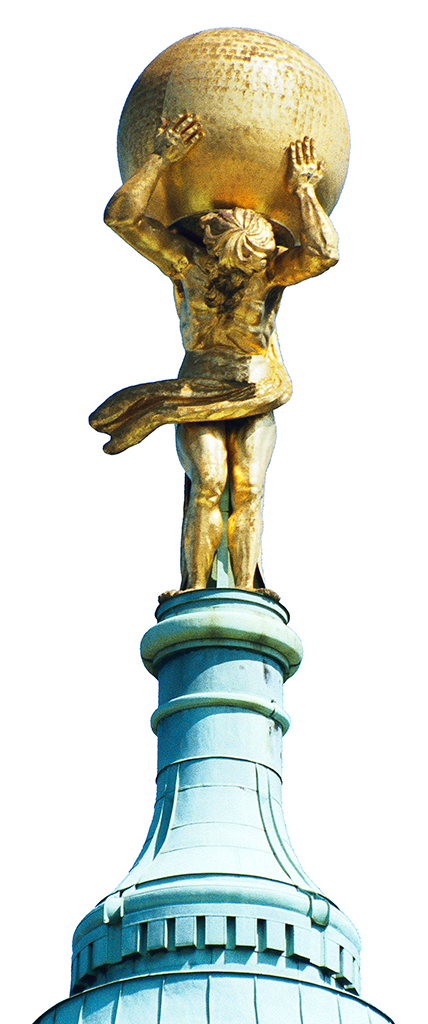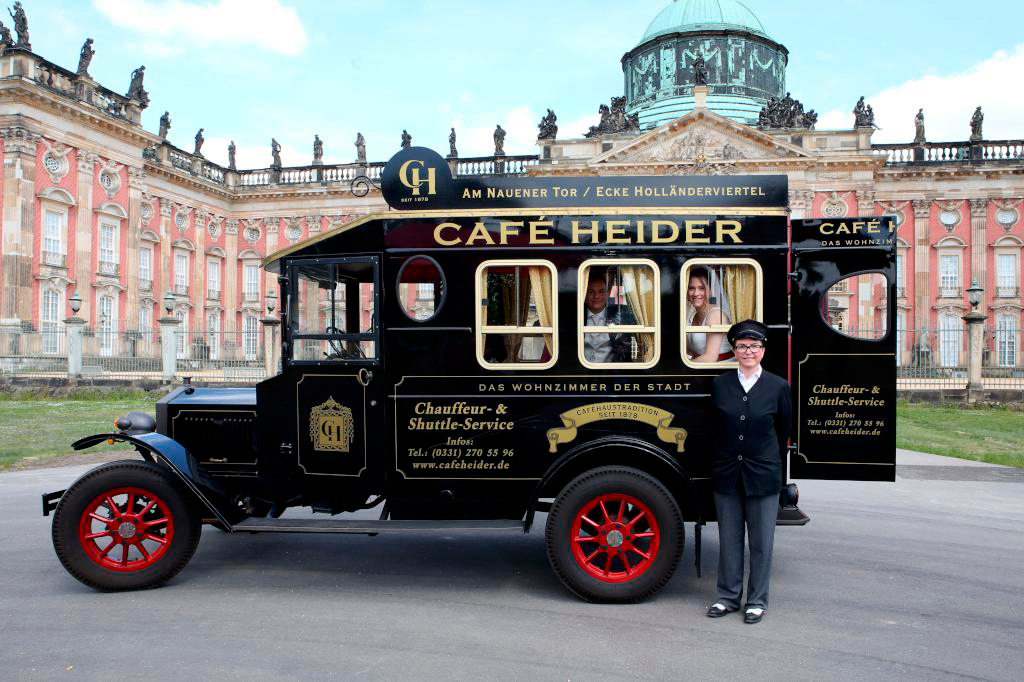POTSDAM AND SANSSOUCI
Potsdam is an important part of European cultural history – a splendid centre of the Enlightenment, which reached its climax in the 18th century in the architectural and artistic design of Frederick the Great’s palace of Sanssouci. The palace complex, with its beautiful, extensive park, is both magnificent and playful. It has been designated a World Heritage Centre of Culture by UNESCO and enchants millions of visitors every year. The town of Potsdam, numbering some 300,000 inhabitants, is the capital of the federal province of Brandenburg. This former garrison town has much to delight visitors, including small palaces and old churches, idyllic parks and historic immigrant settlements.

1.Neues Palais
 Am Neuen Palais • 0331 969 42 00 • 10am–6pm Wed–Mon (Nov–Mar: to 5pm) • The visitor centre is at the south gate; audio guide available • Admission charge • www.spsg.de
Am Neuen Palais • 0331 969 42 00 • 10am–6pm Wed–Mon (Nov–Mar: to 5pm) • The visitor centre is at the south gate; audio guide available • Admission charge • www.spsg.de One of Germany’s most beautiful palaces, the Baroque Neues Palais was built in 1763–9 for Frederick the Great by Johann Gottfried Büring, Jean Laurent Le Geay and Carl von Gontard. The vast structure has 200 rooms, including the Marmorsaal (marble hall), a lavishly furnished ballroom, and the Schlosstheater, where plays are once more performed today. Frederick’s private chambers are equally splendid, especially his Rococo study, the upper gallery with valuable parquet flooring and the Oberes Vestibül, a room clad entirely in marble.

The beautiful Baroque Neues Palais
2.Schloss Sanssouci
 Maulbeerallee • 0331 969 42 00 • Apr–Oct: 10am–6pm Tue–Sun; Nov–Mar: 10am–5pm Tue–Sun; guided tour obligatory • Admission charge • www.spsg.de
Maulbeerallee • 0331 969 42 00 • Apr–Oct: 10am–6pm Tue–Sun; Nov–Mar: 10am–5pm Tue–Sun; guided tour obligatory • Admission charge • www.spsg.de Frederick the Great wished to live “sans souci” (“without worries”) in a palace outside the city. In 1745, he commissioned his favourite architect Georg Wenzeslaus von Knobelsdorff to construct this magnificent Rococo palace according to his own designs. The structure rises proudly above the former terraced vineyards, leading up to the domed building and its marble hall at the centre of the complex. In both its design and shape, the hall pays homage to Rome’s Pantheon. To its left and right are attractive rooms designed by von Knobelsdorff and Johann August Nahl; these include the famous concert room and the king’s library. In this wing, the monarch liked to play the flute or to philosophize with Voltaire. Works by the king’s favourite painter, Antoine Watteau, adorn the palace walls.
3.Schloss Charlottenhof
 Geschwister-Scholl-Str. 34a • 0331 969 42 28 • May–Oct: 10am–6pm Tue–Sun • www.spsg.de
Geschwister-Scholl-Str. 34a • 0331 969 42 28 • May–Oct: 10am–6pm Tue–Sun • www.spsg.de A small Neo-Classical palace in Park Sanssouci, built in 1829 by Schinkel for the heir to the throne, Friedrich Wilhelm IV. Particularly worth seeing is the tent-like Humboldtsaal.
4.Schlosspark Sanssouci
 Chinesisches Haus: Am Grünen Gitter • 0331 969 42 25 • May–Oct: 10am–6pm Tue–Sun • Römische Bäder: Lennéstr. • 0331 969 42 25 • May–Oct: 10am–6pm Tue–Sun • Orangerie: An der Orangerie 3–5 • 0331 969 42 22 • Apr: 10am– 6pm Sat–Sun; May–Oct: 10am–6pm Tue–Sun • www.spsg.de
Chinesisches Haus: Am Grünen Gitter • 0331 969 42 25 • May–Oct: 10am–6pm Tue–Sun • Römische Bäder: Lennéstr. • 0331 969 42 25 • May–Oct: 10am–6pm Tue–Sun • Orangerie: An der Orangerie 3–5 • 0331 969 42 22 • Apr: 10am– 6pm Sat–Sun; May–Oct: 10am–6pm Tue–Sun • www.spsg.de It is easy to spend a day in the park, which covers 287 ha (709 acres). Among the many charming buildings hidden in the landscaped garden is the Rococo-style Chinesisches Haus, built in 1754–6 by Johann Gottfried Büring. It originally served as a teahouse and dining room, and now houses an exhibition of East Asian porcelain. The Römische Bäder (Roman Baths) are lakeside pavilions modelled on an Italian Renaissance villa. They were built as bath- and guesthouses between 1829 and 1840 by Schinkel. The Orangerie, built in 1851–60 by Stüler, was also originally intended for the king’s guests. Today it houses a small gallery of paintings.
5.Schloss Cecilienhof
 Im Neuen Garten • 0331 969 42 00 • Apr–Oct: 10am–6pm Tue–Sun; Nov–Mar: 10am–5pm Tue–Sun • www.spsg.de
Im Neuen Garten • 0331 969 42 00 • Apr–Oct: 10am–6pm Tue–Sun; Nov–Mar: 10am–5pm Tue–Sun • www.spsg.de The 1945 Potsdam Conference was held in this little palace, built in 1914–17 in the style of an English country house. It is a UNESCO World Heritage Site and is now used as a hotel. It also houses a small exhibition documenting the Conference and the palace’s furnishings.
6.Marmorpalais
 Heiliger See (Neuer Garten) • 0331 969 45 50 • May–Oct: 10am– 6pm Tue–Sun; Nov–Apr: 10am–4pm Sat–Sun • www.spsg.de
Heiliger See (Neuer Garten) • 0331 969 45 50 • May–Oct: 10am– 6pm Tue–Sun; Nov–Apr: 10am–4pm Sat–Sun • www.spsg.de This small, early Neo-Classical palace by the Heiliger See was built in 1791–7 by Carl Gotthard Langhans and others. It features an elegant concert hall as well as contemporary furniture and porcelain.
7.Holländisches Viertel
 Friedrich-Ebert-, Kurfürsten-, Hebbel-, Gutenbergstr.
Friedrich-Ebert-, Kurfürsten-, Hebbel-, Gutenbergstr. A pleasant way to explore Potsdam is a walk through the historic Old Town, with its art galleries, cafés and restaurants. Built between 1733 and 1742, the area originally served as a settlement for Dutch workers after whom it is now named. The small red-brick buildings are decorated with attractive stucco ornaments.

House in the Holländisches Viertel
8.Marstall (Filmmuseum)
 Breite Str. 1a • 0331 27 18 10 • 10am–6pm Tue–Sun • www.filmmuseum-potsdam.de
Breite Str. 1a • 0331 27 18 10 • 10am–6pm Tue–Sun • www.filmmuseum-potsdam.de This small museum in the Baroque former stable buildings of the king’s town residence uses old cameras, props and projectors to document the history of German film.
9.Filmpark Babelsberg
The Filmpark offers visitors a tour of the legendary UFA-Studios, which were among the world’s most prestigious when they operated here in Babelsberg from 1917 to 1945. Exciting U-boat trips and thrilling stunt performances and special effects are shown (for further details see Filmpark Babelsberg).
10.Nikolaikirche
 Am Alten Markt • 0331 270 86 02 • 9am–6pm Mon–Sat, 11:30am–5pm Sun
Am Alten Markt • 0331 270 86 02 • 9am–6pm Mon–Sat, 11:30am–5pm Sun Potsdam’s most attractive church was designed by Schinkel in 1830 in an early Neo-Classical style. Its giant dome is particularly striking, and you can ascend it for a breathtaking view over the Stadtschloss, the city palace that is now home to the parliament of Brandenburg.

The Neo-Classical Nikolaikirche
THE POTSDAM CONFERENCE
In July and August 1945, the heads of the governments of the United States (Harry Truman), the USSR (Joseph Stalin) and Great Britain (Winston Churchill) met in Schloss Cecilienhof in order to seal the future of Germany through a treaty. Vitally important points such as the level of reparations to be paid by Germany, the demilitarization of the country, its new borders, the punishment of war criminals, and the resettlement of Germans from Poland were decided here.

A DAY IN POTSDAM

Morning
Begin your exploration in the Schlosspark Sanssouci as early as possible in order to get ahead of the daily influx of visitors. Start with Schloss Sanssouci and Neues Palais then visit the Chinesisches Haus, Römische Bäder and Orangerie. From the orangery’s viewing terrace you will have magnificent views over the entire palace complex. If you are up for it, you could also climb up to Schloss Belvedere on top of the hill. From Schlosspark walk along Voltaireweg to Neuer Garten in the northeast of Potsdam, where you can recover over a tasty lunch at Schloss Cecilienhof.
Afternoon
Start the afternoon looking around Schloss Cecilienhof and stroll through Neuer Garten. Stop for a break at Heiliger See, then head to the centre of Potsdam, starting with the Holländisches Viertel (Dutch quarter) where you could pop into one of the numerous cafés. Stroll past the St Peter-und-Paul Kirche, the Französische Kirche, the Nikolaikirche and the Altes Rathaus to the Marstall film museum. If you have the time, extend your tour by driving to nearby Babelsberg. You could either visit the Filmpark, admire Schloss Babelsberg or walk up Telegrafenberg. To round off your day, a delicious evening meal awaits you at Pino in Potsdam.
The Best of the Rest
1.Alexandrowka
 Russische Kolonie/Puschkinallee
Russische Kolonie/Puschkinallee The Russian colony feels like a village in Tsarist Russia. Decorated log cabins with picturesque gardens were built here in 1826 for a Russian military choir. Don’t miss the museum and the Alexander Newski church.
2.Dampfmaschinenhaus Sanssouci
 Breite Str. 28 • 0331 969 42 25 • May–Oct: 10am–6pm daily • www.spsg.de
Breite Str. 28 • 0331 969 42 25 • May–Oct: 10am–6pm daily • www.spsg.de This building, resembling a mosque with minarets, is the water pumping station for Sanssouci. The 1842 pump can be seen inside.
3.Telegrafenberg
 Albert-Einstein-Str. • Einsteinturm tours Oct–Mar: 0331 29 17 41 • Admission charge
Albert-Einstein-Str. • Einsteinturm tours Oct–Mar: 0331 29 17 41 • Admission charge The elegant Einstein tower on top of Telegraph Hill was designed by Erich Mendelssohn in 1920 to see the sun.
4.Schloss Babelsberg
 Park Babelsberg • Closed for renovation until 2015 • www.spsg.de
Park Babelsberg • Closed for renovation until 2015 • www.spsg.de Built by Schinkel in 1833–5, this Neo-Gothic palace sits in an idyllic park on the banks of the Havel River.

The Neo-Gothic Schloss Babelsberg
5.Potsdamer Stadtschloss
 Neuer Markt
Neuer Markt The Hohenzollern palace that was once the residence of Frederick the Great was badly bombed in World War II and had to be demolished in 1960. It has since been rebuilt as a cultural centre and the seat of the Potsdam legislative assembly.
6.Altes Rathaus
 Am Alten Markt
Am Alten Markt The old town hall, built in 1753, is decorated with sculptures and Potsdam’s coat of arms – two gilded Atlas figures, each carrying a globe on its back.

Altes Rathaus
7.Biosphäre
 Georg-Hermann-Allee 99 • 0331 55 07 40 • 9am–6pm Mon–Fri, 10am–6pm Sat–Sun • Adm • www.biosphaere-potsdam.de
Georg-Hermann-Allee 99 • 0331 55 07 40 • 9am–6pm Mon–Fri, 10am–6pm Sat–Sun • Adm • www.biosphaere-potsdam.de This indoor tropical botanical garden provides visitors with an authentic rainforest experience, complete with waterfalls, iguanas and butterflies.
8.Französische Kirche
 Am Bassinplatz • 0331 29 12 19 • late Mar–mid-Oct: 1:30–5pm Tue–Sun
Am Bassinplatz • 0331 29 12 19 • late Mar–mid-Oct: 1:30–5pm Tue–Sun In 1752, Johann Boumann built this elliptical Huguenot church with its columned portico; Schinkel designed the beautiful interior in the 1830s.
9.St-Peter-und-Paul-Kirche
 Am Bassinplatz • 0331 230 79 90 • 10am–6pm daily (winter: to 5pm)
Am Bassinplatz • 0331 230 79 90 • 10am–6pm daily (winter: to 5pm) The Catholic church of saints Peter and Paul, modelled on Haghia Sophia in Istanbul, was built in 1867–70 by Stüler.
10.Brandenburger Tor
 Luisenplatz
Luisenplatz The most attractive of five former town gates was built by Gontard and Unger in 1770 to celebrate Prussian victory in the Seven Years’ War.
Restaurants
1.Speckers Landhaus
 Jägerallee 13 • 0331 280 43 11 • noon–2pm, 6–11pm Tue–Sat • €€
Jägerallee 13 • 0331 280 43 11 • noon–2pm, 6–11pm Tue–Sat • €€ The combination of a Prussian interior, friendly service and light cuisine make Speckers Landhaus one of Potsdam’s best restaurants.
2.Schloss Cecilienhof
 Neuer Garten • 0331 370 52 33 • noon–11pm daily • €€
Neuer Garten • 0331 370 52 33 • noon–11pm daily • €€ The palace is now a luxury hotel. Its restaurant serves solid German food.
3.Pino
 Weinbergstr. 7 • 0331 270 30 30 • 6pm–midnight Mon–Sat • €€
Weinbergstr. 7 • 0331 270 30 30 • 6pm–midnight Mon–Sat • €€ Close to Park Sanssouci, Pino serves a daily changing menu of exquisite Sicilian fare. The wine list reads like a Who’s Who of Italian vintages.
4.Restaurant Juliette
 Jägerstr. 39 • 0331 270 17 91 • noon–3:30pm, 6pm–midnight Wed–Mon • Closed Jul • €€
Jägerstr. 39 • 0331 270 17 91 • noon–3:30pm, 6pm–midnight Wed–Mon • Closed Jul • €€ A former manor house is the setting for this French restaurant, one of the most charming in Potsdam. It serves top-quality French classics.
5.Brauhaus
 Ribbeckstr. 6–7 • 0331 550 65 48 • 11am–10pm daily • €
Ribbeckstr. 6–7 • 0331 550 65 48 • 11am–10pm daily • € This rustic restaurant, set in the brewery of a historic country manor, Krongut Bornstedt, serves hearty meals with local fish, game, sausages and home-brewed beers.
6.Maison Charlotte
 Mittelstr. 20 • 0331 280 54 50 • noon–11pm daily • €€
Mittelstr. 20 • 0331 280 54 50 • noon–11pm daily • €€ An olde-worlde wine bar in a red-brick Dutch house with outdoor seating in a pleasant courtyard, Maison Charlotte serves French country fare and fine wines.
7.Friedrich Wilhelm
 Im Wildpark 1 • 0331 550 50 • 6pm–late Tue–Sat • €€€
Im Wildpark 1 • 0331 550 50 • 6pm–late Tue–Sat • €€€ This Michelin-starred restaurant in Hotel Bayrisches Haus is probably Potsdam’s best. Light German dishes are exquisitely prepared and presented by Alexander Dressel. In summer, eat on a terrace overlooking a wildflower meadow.
8.Waage
 Am Neuen Markt 12 • noon–midnight Tue–Sun • €€
Am Neuen Markt 12 • noon–midnight Tue–Sun • €€ Attractive historic restaurant in central Potsdam. Regional meat and fish dishes in unusual variations are particularly worth trying.
9.Café Heider
 Friedrich-Ebert-Str. 29 • 0331 270 55 96 • 8am–1am Mon–Fri, 9am–1am Sat, 10am–1am Sun • €
Friedrich-Ebert-Str. 29 • 0331 270 55 96 • 8am–1am Mon–Fri, 9am–1am Sat, 10am–1am Sun • € This lovely café in the middle of Potsdam’s Old Town offers a fantastic breakfast, which you can enjoy outside on the terrace in summer. A vintage Ford can be hired.

Café Heider’s vintage car shuttle
10.La Madeleine
 Lindenstr. 9 • 0331 270 54 00 • noon–midnight daily • no credit cards • €
Lindenstr. 9 • 0331 270 54 00 • noon–midnight daily • no credit cards • € A little bistro serving all sorts of crêpes, such as sweet with jam or savoury with ham – the ideal spot for a quick snack.


